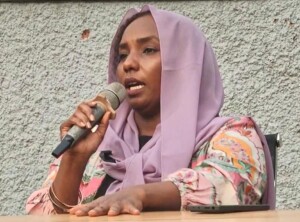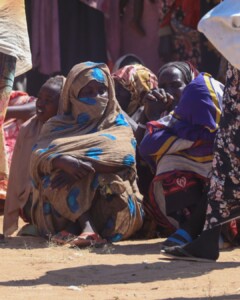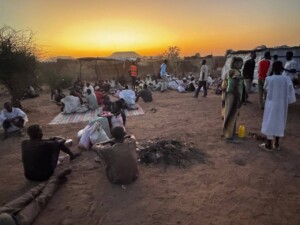UNHCR: ‘Arrivals of newly displaced from West Darfur risks outpacing capacity’
People newly displaced during the recent violence in El Geneina in West Darfur who have been sheltering in government institutions have reiterated their complaints about the poor humanitarian conditions and the lack of water and food. The UN Refugee agency (UNHCR) has confirmed the transfer of more than 300 newly displaced people to a refugee camp in Chad.
 The newly displaced people in El Geneina (File photos RD)
The newly displaced people in El Geneina (File photos RD)
People newly displaced during the recent violence in El Geneina in West Darfur who have been sheltering in government institutions have reiterated their complaints about the poor humanitarian conditions and the lack of water and food. The UN Refugee agency (UNHCR) has confirmed the transfer of more than 300 newly displaced people to a refugee camp in Chad.
In a statement, the UNHCR confirmed that the recent violence in El Geneina caused more than 11,000 people to flee as refugees into neighbouring Chad since last month. 4,000 of them fled during last week alone and it is estimated that the clashes have displaced some 46,000 internally. The statement includes these newly displaced people in need of urgent help. “However, the rate of refugee arrivals risks outpacing our capacity,” the statement said.
On Thursday, a displaced woman told Radio Dabanga that she and her children have been staying in one of the shelter centres for more than a month with more than 2,000 other displaced people, with only four toilets. She expressed her concern that the health conditions might deteriorate further because of the lack of adequate toilets. “There is already a spread out of influenza and diarrhoea, especially among children,” she said. She further explained that there are insufficient blankets in this cold season.
The newly displaced people conditioned their return to the destroyed Kerending camp upon the provision of security, reconstructing their burned houses, and compensation of their losses, as well as the withdrawal of the Rapid Support Forces government militia from the state and the return of humanitarian organisations.
On Thursday, Maj Gen Abdallah Adam, the acting governor of West Darfur appealed to the international and national organisations to provide urgent support for the newly displaced people who are currently sheltering in the government institutions to return to their former displaced people camps.
While addressing several representatives of international and national NGOs during his visit to Kerending camp, the acting governor warned against a health crisis if the newly displaced people continue living under the current conditions in El Geneina city.
“Having these people continuously living inside government institutions is not normal and is unacceptable. This situation has led to a complete dysfunction of government institutions and disrupts the interests of residents,” he said.
The governor accused some political actors of polarising the newly displaced people so that they will not return to their former camps. He pledged to provide adequate security and hunt down the perpetrators of the recent crimes committed in El Geneina.
He also said that the presence of the organisations is a grantee of safely and peacefully return of the displaced people to their former camps. He appealed to the humanitarian organisations to help with the process of safely and peacefully return as well as reconstructing the camps.
On Thursday, more than 300 people newly displaced by the recent violence in El Geneina who fled to the Chad-Sudan border were transferred to Marra El Jadid refugee camp, 40 km east of Abeche in Chad.
Activist Bashir Daoud told Radio Dabanga that of these 300 people who fled the violence of Kerending camp, most are women and children.
He clarified that the governor of Waday state in eastern Chad and the UNHCR welcomed the newly displaced people. The activist also explained that other groups are waiting to be transferred to the camp after the registration procedures are carried out.
Radio Dabanga’s editorial independence means that we can continue to provide factual updates about political developments to Sudanese and international actors, educate people about how to avoid outbreaks of infectious diseases, and provide a window to the world for those in all corners of Sudan. Support Radio Dabanga for as little as €2.50, the equivalent of a cup of coffee.












 and then
and then